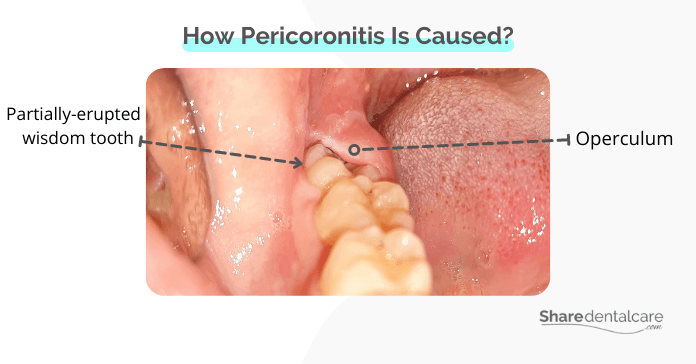Pericoronitis is an inflammation of the gum tissue flap (operculum) covering a partially-erupted or impacted tooth. It usually occurs around the lower wisdom teeth (third molars) because they do not have enough room to erupt properly. However, pericoronitis may occur during the eruption of first or second molars, but this is less common. In this blog post, we will discuss whether or not you can have pericoronitis without wisdom teeth.
What is Pericoronitis?
Before discussing whether or not you can have pericoronitis without wisdom teeth, it is important to understand what pericoronitis is. As stated earlier, the operculum is a flap of gum tissue that may develop around the crown of a partially erupted or impacted tooth. The operculum covers the chewing surface of the tooth during the eruption.
The operculum area is difficult to clean, so food debris and bacteria can easily accumulate there. This accumulation of food debris and bacteria can lead to an infection known as pericoronitis, an inflamed and painful gums around your wisdom tooth.
The most common symptom of pericoronitis is pain. The pain may be dull or throbbing and radiate to the ear, jaw, or neck. Other symptoms include:
- Swelling and redness of the gum tissue around the affected tooth
- Foul-smelling breath. You can read more about the unpleasant smell of pericoronitis.
- Dental abscess
- Bad taste in the mouth
- Difficulty opening the mouth
- Fever

Can You Get Pericoronitis Without Wisdom Teeth?
Pericoronitis most often affects people aged 15 to 26 during the eruption of lower wisdom teeth because they are the last teeth to erupt. By the time wisdom teeth erupt, there is often not enough room in the mouth for them. As a result, they become impacted or only partially erupted, causing the operculum to develop. This makes it difficult to clean the area and increases the risk of pericoronitis.
While wisdom teeth are the most common teeth affected by pericoronitis, it is possible to develop the condition around the partially erupted first or second molars. The inflamed operculum can develop around any partially erupted or impacted tooth. This means that you can have pericoronitis without wisdom teeth. However, this is less common because the first and second molars are rarely impacted.
Pericoronitis is seen in children, around the age of 11 to 13 years, when their lower second molars are erupting. The operculum develops over the chewing surface of the second molars, causing pericoronitis.
Pericoronitis Pain Despite Wisdom Teeth Removal
Many people complain of pericoronitis pain, even years after their wisdom teeth have been removed. This happens because there are other conditions that can similar pain, such as:
- Tooth decay: When tooth decay bacteria reaches the tooth pulp, it can cause pain similar to pericoronitis.
- Gum disease: It is a bacterial infection of the gums. Gum disease can cause pain, swelling, and redness of the gums.
- Tmj disorders: It is a condition that affects the temporomandibular joint (TMJ). It can cause pain in the third molar region, jaw, neck, and ear.
You can have pericoronitis pain without wisdom teeth. This is because the pain can occur as a result of other conditions. So, it is important to see your dentist for identifying the underlying cause. Only a dentist can properly diagnose the cause of your pain and provide the appropriate treatment.
Treatment of Pericoronitis Without Wisdom Tooth
Pericoronitis that occurs around the first and second molars is usually temporary due to their incomplete eruption. Also, these teeth are rarely impacted, unlike wisdom teeth (third molars). When the first and second molars erupt completely and normally, the operculum will disappear.
For the treatment of pericoronitis, your dentist may recommend:
- Professional teeth cleaning: The dentist will use a special instrument (scaler) to remove bacteria and food debris around the tooth.
- Pain medications: Your dentist will prescribe pain medications like ibuprofen (Advil) or acetaminophen (Tylenol) to help manage the pain. Here is a list of OTC pain relievers.
- Antibiotics: Your dentist may prescribe antibiotics and/or antiseptic mouthwash to help control swelling and infection.
- Surgical removal of the operculum: If the pain and inflammation are severe, your dentist may recommend minor oral surgery to remove the gum tissue flap covering the tooth. This procedure is known as operculectomy.
- Tooth extraction: Your dentist may recommend extraction in the case of impacted teeth that won’t come in normally, such as wisdom teeth.
The treatment of pericoronitis usually involves a combination of professional teeth cleaning and home remedies. You can read more about pericoronitis home remedies.
Conclusion
In conclusion, pericoronitis is the inflammation of the gum tissue flap (operculum) around the crown of a partially erupted or impacted tooth. Pericoronitis usually occurs around the lower wisdom teeth because they don’t have enough room to erupt. However, you can have pericoronitis without wisdom teeth. The operculum can develop around partially erupted first or second molars, but this is less common. In children, pericoronitis can occur during the eruption of lower second molars.
Many people confuse pericoronitis pain and pain caused by other conditions such as tooth decay, gum disease, and TMJ disorders. So, it is important to see a dentist. Only a dentist can properly diagnose the cause of your pain and provide the appropriate treatment.